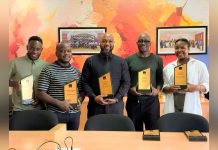Africa-Press – Uganda. A year ago, President Museveni instituted a nationwide lockdown to curb the spread of the Covid-19 virus.
With 15 million learners in the country, the outbreak in any school community would have led to disastrous outcomes.
The strategy worked, and across the globe, Uganda despite having more than 40,000 known cases, its death rate of less than 500 is among the lowest in the world.
While the pandemic caused a radical shift into digital and technological for learning and work spaces for mostly urban children, those in rural areas, without access to electricity and Internet were the most cut off from continued forms of learning.
According to Save the Children, more than one billion children are out of school due to the global pandemic.In a research by Initiative for Social Economic Rights, on “Barriers to Continuity of Education for Vulnerable Children Impacted by Covid-19 in Uganda” many children note that they will not return to school due to the work they have been engaged in during the lockdown, some are child mothers while others find the cost of study high compared to the cost of staying home.
That notwithstanding, local education leadership organisations such as Teach For Uganda, that swung into action to prevent more deleterious effects of the pandemic on the learning outcomes of their children.
This innovation was hailed by UNESCO and World Education Commission in their “Save our Future White Paper” (pg 15) to be keeping the most vulnerable children learning.
Today, TFU is partnering with WarChild Holland to leverage the power of digital learning technologies such as the globally recognised Can’t Wait to Learn (CWTL) App to help rural learners compete with their counterparts in Urban cities.
Rural public primary and secondary schools in Uganda are a catchment area for the majority (80 per cent) of our children and youth in school today. Digital learning technologies give us a chance of producing well-rounded and digitally competent learners. Using digital spaces to leverage education of learners to think bigger and different and as well as to work towards reimaging what learning is like in the new normal.
However, technology alone is not a panacea for learning. Competent and willing teachers who care about their children beyond the classroom are the engines of any great education system.
This is the more reason, they’ve raised resources to higher, train and place Uganda’s most talented graduates- teacher leaders- two per school to support the headteachers and the school management to bridge capacity leadership gaps in management, parental engagement and resource utilisation to enable all our children a healthy learning environment.The world is quickly evolving towards digital solutions to the problems in our communities and nations.
The pandemic is an eye-opener to many education systems and indeed health systems across the globe to rethink their service provision strategies and pivot towards digital competence.
TFU and WarChild, may be on the right side of history, if such an initiative that answers major questions for our education system are invested in and given a larger platform in our social and political discourse. As the world shifts and adapts to provide inclusive and quality education for all during and post pandemic, it’s important to recognize the promise and hope that such digital learning platforms provide for the most rural and cut off communities in accelerating their learning outcomes, improving education levels and addressing drop out issues.
Tricia Gloria Nabaye, [email protected]. The article is co-authored by James ArinaitweKassaga






